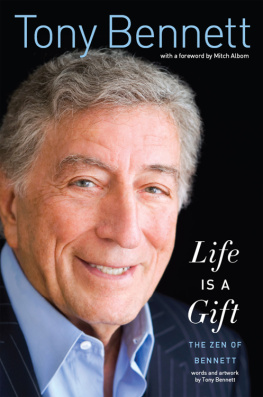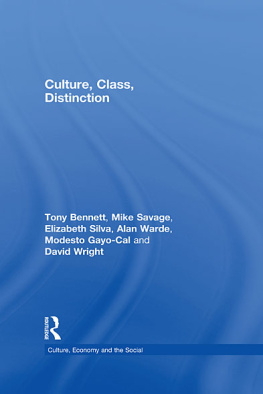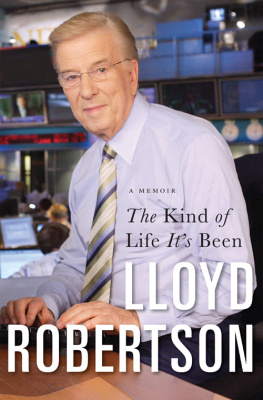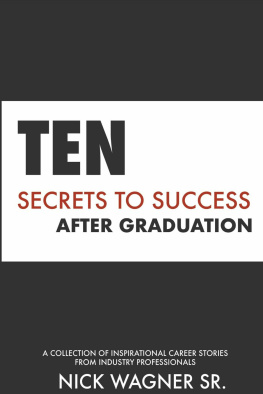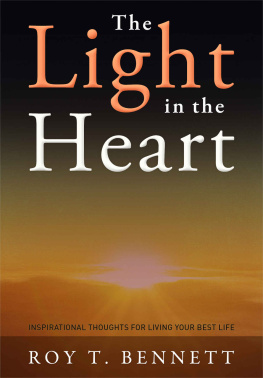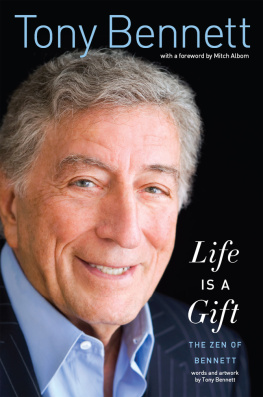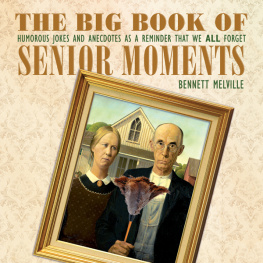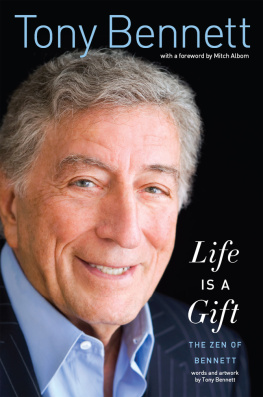I would like to acknowledge:
My son and manager, Danny Bennett, and the entire RPM Productions team: Sylvia Weiner, Hadley Spanier, Dawn Olejar, Joe Rhoades, and my assistant, Seth Ferris, for all their support and help at every turn.
Id like to thank my tour manager, Vance Anderson; my sound man, Tom Young; and my quartet: Lee Musiker, Gray Sargent, Harold Jones, and Marshall Wood; as well as all the musicians who have supported me through the years.
Dick Golden, for his invaluable contributions.
WME and my literary agent, Mel Berger.
HarperCollins, for all their enthusiasm and belief in the project; particularly Lisa Sharkey and Amy Bendell.
Leslie Wells and Jonathan Ehrlich for all their great work.
My wife, Susan Benedetto, for keeping everything on track.
And my dear friend Mitch Albom for his kind words.


All artwork Tony Bennett/Anthony Benedetto and used courtesy of Benedetto Arts, LLC.
T ony Bennett, a true Renaissance man, grew up in Astoria, Queens, during the Great Depression in a family of Italian immigrants. After serving as an infantryman in World War II, he studied singing, and then signed with Columbia Records, releasing his first hit in 1951. He entered his seventh decade as a recording artist with seventeen Grammy Awards to his name, including the Grammy Lifetime Achievement Award and a multiple Emmy winner. He made history in the 1990s when he won the coveted Grammy Album of the Year for his MTV Unplugged , beloved by audiences from nine to ninety. He is credited with heralding in the iPod generation; as the New York Times aptly put it, he has not just bridged the generation gap; he has demolished it. He has performed for eleven United States presidents, and has appeared at seven Royal Command Performances.
In addition to performing, Tony Bennett is an accomplished visual artist, with three of his original paintings featured in the permanent collection at the Smithsonian Institution. Tony marched alongside Dr. Martin Luther King in 1965 on the historic march to Selma, and his humanitarian efforts are renowned; the United Nations honored him with their Humanitarian Award in 2007. Bennett founded, in association with the Board of Education in New York City, the Frank Sinatra School of the Artsa public high school for the arts in his hometown of Astoria, Queens. With his wife, Susan, he established Exploring the Arts, a charitable organization that supports arts education in public high schools in New York City.
Tony is the author of three books, The Good Life , Tony Bennett: What My Heart Has Seen , and Tony Bennett in the Studio: A Life of Art and Music . A new documentary, The Zen of Bennett , created and conceived by the singers son Danny Bennett, recently premiered at the 2012 Tribeca Film Festival, and is a companion project to this latest book by Tony, Life Is a Gift: The Zen of Bennett.
Tony Bennetts timeless appeal has endured, and will continue to do sofor his passion, dedication, and joy for his artistry does not diminish, and in fact continues to grow and inspire his many generations of fans.
Visit www.AuthorTracker.com for exclusive information on your favorite HarperCollins authors.
Australia
HarperCollins Publishers (Australia) Pty. Ltd.
Level 13, 201 Elizabeth Street
Sydney, NSW 2000, Australia
http://www.harpercollins.com.au/
Canada
HarperCollins Canada
2 Bloor Street East - 20th Floor
Toronto, ON, M4W, 1A8, Canada
http://www.harpercollins.ca
New Zealand
HarperCollins Publishers (New Zealand) Limited
P.O. Box 1
Auckland, New Zealand
http://www.harpercollins.co.nz
United Kingdom
HarperCollins Publishers Ltd.
77-85 Fulham Palace Road
London, W6 8JB, UK
http://www.harpercollins.co.uk
United States
HarperCollins Publishers Inc.
10 East 53rd Street
New York, NY 10022
http://www.harpercollins.com
I grew up in an era when there was no such thing as planned obsolescence; instead, everything was made with quality. Like so many people my age who came out of the Great Depression, I grew up with a strong sense of appreciation for what little we had. My grandfather owned a grocery store, and my mom was a seamstress working under sweatshop conditions. But despite the harsh circumstances, they always took time to make the children in the family feel special. I never took for granted the importance of the love of my family and friends to pull me through hard times. They taught me humility, and instilled in me a work ethic that remains to this day.
I was drilled not to be the best, but to always strive to do my bestand that if I did, the rewards would follow. I was told that everything I do should be done with care. Even now, I feel strongly that if you buy a suit or a dress, it should be well made, and it should last for yearsinstead of a con job where you buy something only to have to replace it after it falls apart six months later. You can go broke that way. It makes better sense to save up your money to buy one well-made suit than ten cheap suits.
There should be a law against planned obsolescence, and everyone should follow this lead. In other words, an artist or a company, or an individual, should not put out a work of art, or a song, or any product that he knows wont endure.
When I was ten, my father passed away. After he died, my mother had to support the three of us kids all by herself. She did what they called piecework, earning a penny per dress, sewing all day long in the factory. Shed bring work home with her every night. Once or twice in an evening, shed come across a bad dressone of such poor quality that shed refuse to work on it. We were desperate for money, but she couldnt bring herself to do something she felt was beneath her. I only do quality dresses, she would say. Im not going to work on a bad one. Many years later, I realized that this was the attitude I held toward my job, too. She became my inspiration for insisting on singing only quality songs.
Years later, another experience that reinforced this idea was my training at the American Theatre Wing on Forty-Fourth Street, which I attended after returning home from Germany after my service in World War II. The government had set up the GI Bill so that soldiers could receive an education. The bill paid tuition for either trade school or college and gave a lot of fellows like myself the chance to keep going with the education that the war had interrupted, and to attend a school we couldnt have afforded without it. People like Marlon Brando, Harry Belafonte, Paul Newman, Shelley Winters, and Sidney Poitier took classes there.
The Theatre Wing was a fantastic school, and my teacher had trained with Stanislavsky, who founded Method acting. Ive applied the techniques I learned in that school to my singing ever since. I think of the lyrics in an autobiographical way, as if they were written about something Ive lived through. Not every song allows for this; only the well-crafted ones do. So I make it a point to seek out quality songs that provide that kind of powerful emotion, and as a result, the public can experience them the way that I do. As they listen to me sing, they get an honest sense of how Im feeling while I perform. This connection between singer and audience would be impossible if I added a cheap song to my repertoire, which is why I never have.
The Theatre Wing not only taught me the importance of doing quality work; my teachers there also told me not to listen to anyone who tried to tell us otherwise. I never really appreciated how valuable that attitude was until the producer Mitch Miller signed me to my first recording contract in 1950.
Next page
